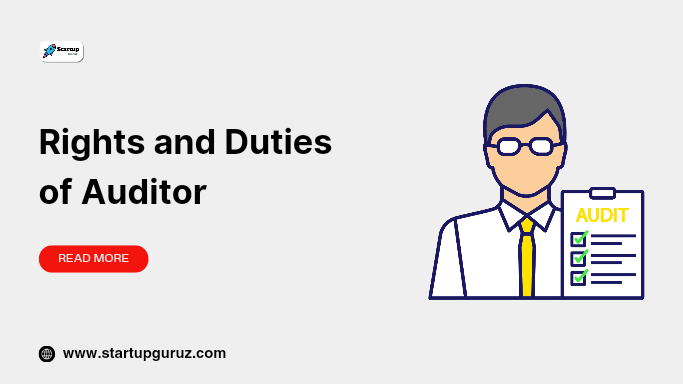Rights and Duties of Auditor
Introduction to Auditors’ Rights and Duties
Auditors play a crucial role in ensuring the accuracy and reliability of financial information presented by companies. Understanding their Rights and Duties is essential for maintaining transparency and accountability in financial reporting.

Importance of Auditors in Financial Reporting
Auditors provide assurance to stakeholders by independently examining financial statements and reporting any discrepancies or irregularities. Their role enhances the credibility and trustworthiness of financial information, which is vital for investors, creditors, and regulatory authorities.
Rights of Auditors
Auditors have several rights, including:
- Access to company records, documents, and information.
- Independence in performing their duties.
- Right to obtain explanations and clarifications from company management.
- Right to report findings and concerns to the board of directors or shareholders.
Duties of Auditors
The primary duties of auditors include:
- Conducting audits in accordance with professional standards and regulatory requirements.
- Performing audit procedures to obtain reasonable assurance about the accuracy and completeness of financial statements.
- Reporting any material misstatements or fraud detected during the audit.
- Maintaining professional skepticism and objectivity throughout the audit process.
Auditor’s Independence and Objectivity
Auditor independence is critical to ensuring the integrity and reliability of audit opinions. Independence allows auditors to perform their duties without bias or undue influence from company management. Objectivity ensures that auditors remain impartial and fair in their assessment of financial information.
Legal Framework Governing Auditor’s Rights and Duties
Auditors’ rights and duties are governed by various laws, regulations, and professional standards, including:
- Companies Act (or equivalent legislation) in the respective jurisdiction.
- International Standards on Auditing (ISA) issued by the International Auditing and Assurance Standards Board (IAASB).
- Regulatory requirements imposed by government agencies or regulatory bodies.
Challenges Faced by Auditors
Auditors often encounter challenges such as:
- Limited access to information or resistance from company management.
- Pressure to meet tight deadlines and budget constraints.
- Complexity of audit engagements, especially in multinational corporations or industries with specialized accounting practices.
- Increasing regulatory scrutiny and legal liability risks.
Role of Auditors in Corporate Governance
Auditors play a crucial role in promoting good corporate governance by:
- Providing independent oversight of financial reporting processes.
- Identifying and addressing internal control weaknesses and governance deficiencies.
- Enhancing transparency and accountability in corporate operations.
- Upholding ethical standards and integrity in financial reporting.
FAQs on Auditors’ Rights and Duties
Q1: Can auditors be held liable for negligence or misconduct? A1: Yes, auditors can be held liable for negligence or misconduct if they fail to exercise due care and professional skepticism in performing their duties.
Q2: What is the difference between statutory audit and internal audit? A2: Statutory audit is conducted to verify the accuracy of financial statements for compliance with legal requirements, while internal audit focuses on evaluating internal controls and operational efficiency.
Q3: How do auditors ensure independence and objectivity? A3: Auditors ensure independence and objectivity by maintaining professional skepticism, avoiding conflicts of interest, and adhering to ethical standards and regulatory requirements.
Q4: What are the consequences of audit failure? A4: Audit failure can result in loss of investor confidence, regulatory sanctions, legal claims, reputational damage, and financial losses for stakeholders.
Q5: Can auditors refuse to sign off on financial statements? A5: Yes, auditors can refuse to sign off on financial statements if they have concerns about the accuracy or completeness of the information presented.
Q6: How often should audits be conducted? A6: Audits should be conducted at least annually, but the frequency may vary depending on the size, complexity, and risk profile of the organization.
Q7: What is the difference between a qualified and unqualified audit opinion? A7: A qualified audit opinion indicates that the auditor has identified significant issues or limitations, while an unqualified opinion signifies that the financial statements are free from material misstatements.
Q8: Can auditors provide consulting services to their audit clients? A8: Auditors should avoid providing consulting services to their audit clients to maintain independence and objectivity in performing their audit duties.
Q9: How are auditors selected for audit engagements? A9: Auditors are typically selected based on their qualifications, experience, reputation, and independence from the audited entity.
Q10: What are the key components of an audit report? A10: An audit report typically includes an introductory paragraph, management’s responsibility section, auditor’s responsibility section, opinion on financial statements, and other required disclosures.
Conclusion
Auditors play a critical role in upholding financial integrity, transparency, and accountability. Understanding their rights and duties is essential for ensuring effective financial reporting, investor confidence, and good corporate governance. By adhering to professional standards and ethical principles, auditors contribute to the trust and reliability of financial information in the global marketplace.